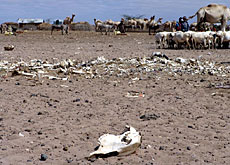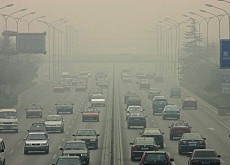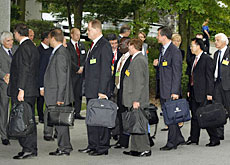Leuenberger considers problems facing Africa

Environment Minister Moritz Leuenberger is visiting Kenya and Ethiopia this week to take part in the post-Kyoto climate talks and discuss Swiss-African cooperation.
Leuenberger will also be touring a number of climate-related projects in Kenya which are supported by Switzerland.
The minister, who is also this year’s Swiss president, has repeatedly stressed the importance of focusing greater attention on the African continent.
Africa, already on the edge environmentally, is expected to suffer most from shifting climate zones and droughts, like the one now in its fourth year in east Africa.
André Simonazzi, head of communications at the Federal Environment Office, said that in addition to attending the UN conference on climate change in Nairobi, Leuenberger wanted to gain a picture of climate change realities.
“And he wants to show that we have a special responsibility towards this continent,” Simonazzi told swissinfo.
Leuenberger will be representing Switzerland during the conference, which runs until November 17, and will deliver a special message during the opening of the ministers’ session on November 15.
The two-week summit is focusing on the second phase of the Kyoto Protocol on lowering harmful emissions. It will consider how to reduce greenhouse gases beyond 2012 and measures to help countries adapt to climate change.
Switzerland has played an active role in the preparation of the meeting, in particular by organising informal talks between environment ministers and delegates in Zurich in September.
Talks
In Nairobi Leuenberger is also due to meet his Kenyan counterpart Emilio Mwai Kibaki and both are expected to sign a joint investment agreement.
He will visit several environmental projects supported by the Swiss Agency for Development and Cooperation (SDC).
Global warming is thought to be largely behind the increase in cases of malaria in regions which were previously safe, such as the Kenyan Highlands.
The Swiss delegation will therefore visit the Centre of Insect Physiology and Ecology, one of the main biodiversity research institutes in Africa, to gain insight into the problem.
In addition, a meeting is planned with Nobel Peace Prize winner and Kenyan environmentalist Wangari Maathai, the founder of Kenya’s Green Belt Movement which recently launched a campaign to plant one billion trees in the coming year to fight global warming.

More
Swiss Agency for Development and Cooperation (SDC)
Slums
Leuenberger will also visit a school in a Nairobi slum district, home to many drought-affected families.
“The visits are to show that the effects [of global warming] are now and can be particularly dramatic for populations who are forced to migrate,” said Simonazzi.
The minister will then move on to the Ethiopian capital, Addis Ababa, on November 17, to hold talks with his Ethiopian counterpart, Girma Wolde-Giorgis, and with African Union president Alpha Oumar Konaré to discuss the union’s conflict-prevention role and the concept of good governance.
Leuenberger will end his whistle-stop tour of east Africa with a speech at the African Development Forum on “Youth and leadership in the 21st century”.
swissinfo, Simon Bradley
The Kyoto Protocol, an amendment to the UN Convention on Climate Change, was approved in 1997 and came into force in 2005. It has been ratified by industrialised countries – apart from the US and Australia – and by a large number of developing countries.
It calls for industrialised nations to reduce harmful emissions by an average of 5.2% below 1990 levels by 2012.
The Swiss CO2 law formally took effect in 2000 and foresees additional measures if the targets can’t be met with voluntary means.
On November 8 the government declared that Switzerland had met its formal requirements under the Kyoto Protocol to reduce greenhouse gases by 8% below the 1990 level – or a maximum of 242.85 million tons of CO2 – between 2008 and 2012.
Swiss Environment Minister Moritz Leuenberger will travel to Kenya and Ethiopia from November 13 to 17.
The 12th UN Climate Conference in Nairobi is running from November 6 to 17.
Around 6,000 delegates and observers from 190 countries are attending the two-week summit.
Switzerland was the 110th country to ratify the Kyoto Protocol in 2003.
Swiss development aid to Africa in 2005: SFr392.4 million ($314.3 million).

In compliance with the JTI standards
More: SWI swissinfo.ch certified by the Journalism Trust Initiative





You can find an overview of ongoing debates with our journalists here. Please join us!
If you want to start a conversation about a topic raised in this article or want to report factual errors, email us at english@swissinfo.ch.